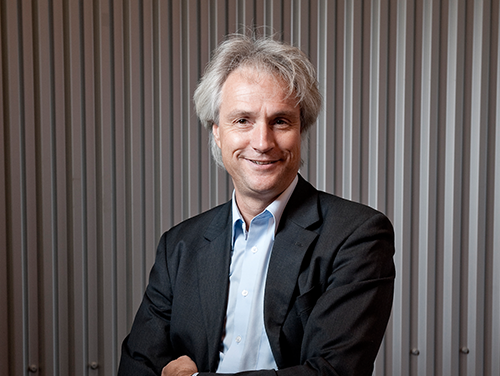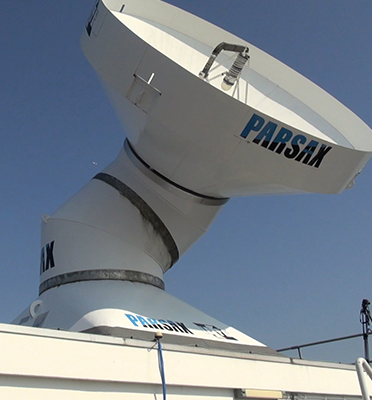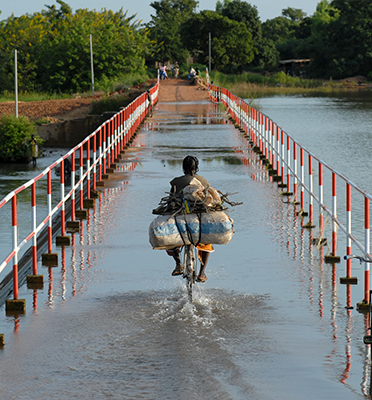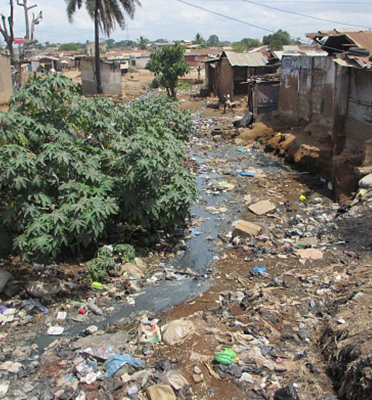Renewing our urban water infrastructure
Reliable tap water, proper waste water treatment, and dry feet. That’s what people in the Netherlands expect and are accustomed to. However, flooded homes, sewer overflows and impassable roads occur with increasing frequency. The Randstad conurbation has suffered from severe water issues in recent months for instance. The KNMI [Royal Netherlands Meteorological Institute] has predicted that the number of extreme showers will further increase in the 21st century due to global warming. The water infrastructure in our urban areas isn’t built to accommodate this, warns Professor Jules van Lier. He argues in favour of smarter solutions and a new paradigm for our Urban Water Infrastructure.
Devising solutions to our water issues and renewing our water infrastructure cannot be left to a single discipline posits Jules van Lier. It requires knowledge of drinking water provision, waste water treatment, asset management, new materials for pipelines and structural engineering, smart monitoring techniques, etc. “TU Delft is the only place that encompass all required disciplines to tackle our future urban water challenges, but things are still a bit scattered and not well recognisable. We are currently proposing a more structured thematic approach, in which knowledge from various disciplines is combined and cooperation is pursued within and between faculties.”
“TU Delft is the only institute with all the required disciplines to tackle this problem in one place.”
Management and maintenance
Water authorities and municipalities in particular require this applied knowledge. “There are a couple of hundred billion-worth assets including a few hundred thousands kilometres of pipelines under Dutch soil and many of these could do with being replaced by now. This costs enormous sums of money. Municipalities desperately need asset management tips and tricks to keep things working for longer.” TU Delft could also contribute to the early detection of potential issues in sewers and other pipelines. “Sensor technology could be applied to pipelines, robots could be sent down them or satellites could be utilised to trace risks,” says Jules van Lier. “A lot of improvements could be made in the field of remote sensing technologies for water infrastructure. We can work on that as part of this theme.”
A closed cycle
According to Jules we will also have to learn to think differently about waste water treatment. In his opinion we could deal with our drinking and waste water much more efficiently if we think in terms of cycles and recycling. He explains: “The basis for our sanitary system dates back to the Roman era. We collect our waste water that consists of rainwater, sewage and grey water together in a single place using drains and pipelines, followed by discharge to the sea or we treat it to legal standards, as we do in the Netherlands. Why don’t we separate these flows to be able to recycle them faster and better? In addition, at present we can harvest raw materials from the sewage and generate energy from waste water. Now, re-thinking our urban water flows with the objective to recover resources, including treated water for reuse, will certainly impact our urban water infrastructure. We have to arrive at a different paradigm: we should think less consumptively and more cyclically!”
“We should think less consumptively and more cyclically!!”
Although the Netherlands has a stringent legislation with regard to waste water treatment, a number of components are reaching the effluent discharge without proper treatment. Constituents of rising concern are the so-called priority pollutants, such as medicine rests, and resistance against antibiotics. Mentioned compounds are often discharged in relatively large amounts by hospitals and elderly care homes. “If, during extreme showers, the sewers are full and overflow, this polluted water immediately ends up in the environment.” To keep health risks as low as possible, Jules thinks we should continuously make our infrastructure safer.
An entirely different approach
Urban water infrastructure research not only benefits the Dutch water infrastructure. Jules also sees global opportunities. ‘‘With the Netherlands’ knowledge of deltas and construction in weak and soggy soils we can really make a difference in overpopulated deltas elsewhere.” To him the challenge lies in conceptualising how to develop and implement these systems in countries that are so far refrained from any water infrastructure to speak of. “There’s an opportunity there to get things right at first time, so you can skip the entire development the Netherlands went through. Hooking all of India up to sewerage is impossible so we will have to come up with more creative solutions.” Decentralised solutions for example in which you downsize the chains. Or you provide the means for people to treat their own waste water much closer to home.
Ambition
Existing urban water infrastructure initiatives and studies will be further expanded over the coming years. A number of people are already working on this subject. Marie Claire ten Veldhuis is an assistant professor of urban hydrology and Lisa Scholten started an asset management tenure track this year. Professor Francois Clemens has been seconded from Deltares for one day a week and Jeroen Langeveld (who was seconded by the business community) manages the ‘Urban Drainage’ knowledge programme that the faculty, Rioned and the larger Dutch municipalities are working on. The latter currently has some 10 PhD students.
However, to be able to achieve its ambitions the faculty wants to set up a complete chair and attract a full-time professor. “In five years’ time I hope we will have a fully-fledged, interdisciplinary group here that critically assesses the complex issues and generates realistic solutions that are as non-consumptive and cyclical as possible.”
Onderwijs |
The Urban Water Infrastructure theme will also be given a place in education. The current Water Management master track will change its curriculum. This track had three majors within the sanitary engineering specialisation: waste water, drinking water and sewerage. These will be replaced by the thesis track Urban Water Engineering (UWE). The Water Management department will also start the new master track Environmental Engineering (EE) in September 2016, which is a collaboration with the Faculty of Applied Sciences. What’s the difference? |
Urban Water EngineeringUWE will deal with the qualitative aspects of water management such as drinking water distribution networks, sewers and the discharge and retention of rainwater. The department expects this to be a hit with Civil Engineering bachelor students. Jules explains: “Civil engineering students have less of an affinity with chemistry and biology; they are more interested in construction engineering. Within this theme they can focus on the quantitative aspect which is closer to their true nature”. |
Environmental EngineeringThe Environmental Engineering track will focus on water treatment technologies and the more physics, chemistry and biology-related aspects. The Faculty of Applied Sciences will help us with this track. 30 students have already registered for the 2016 - 2017 academic year and most of them are from other Dutch universities or from abroad. This master track is new and unique in the Netherlands. Jules explains: “The study programme with a similar name, Environmental Sciences in Wageningen, focuses on sociology, management and environmental technology whilst this track in Delft is purely about engineering. In Wageningen they are also more interested in the interaction with agriculture, while TU Delft’s focus is on urban infrastructure. In that sense the two study programmes are complementary!” |




